If you are breast/chestfeeding and your body is producing milk, this is the time to listen to those hunger cues. Nutrient and energy needs increase both to support milk production and your recovery from labor and birth. Energy (calorie) needs for those first six postpartum months are actually higher than during pregnancy if you are exclusively making milk for your baby. In this blog post you’ll find encouragement on embracing your hunger cues and eating adequately, as well as tips related to specific vitamins and nutrients, warnings about the effects of under-eating, reminders about the importance of hydration and links to other resources for breast/chestfeeding individuals.
Let’s start by discussing…
Common reasons not to be eating enough:
- Being busy with a newborn
- Not having time or energy to prepare foods
- Being stuck under a newborn sleeping on you or feeding from you
- Feeling anxious to “lose the baby weight”
- Trying to “be careful” about eating “too much,” counting calories or limiting portion sizes. You know I’m not one for these diet tricks at any time, but especially not now.
You’ll notice some of the reasons on this list are impossible to really change (you will be busy and you will have less energy and time to prepare foods), so what you can do is be as proactive as possible about making adequate nourishment a priority. We’ll be giving lots of advice on this throughout this post. Of course, the last few reasons- related to worrying about body size and manipulating your weight- are things you can actively work towards eliminating. Spending some of your pregnancy or postpartum intentionally healing your relationship with food and making peace with the body you inhabit can be immensely freeing and revolutionize the way you experience life after baby has arrived.
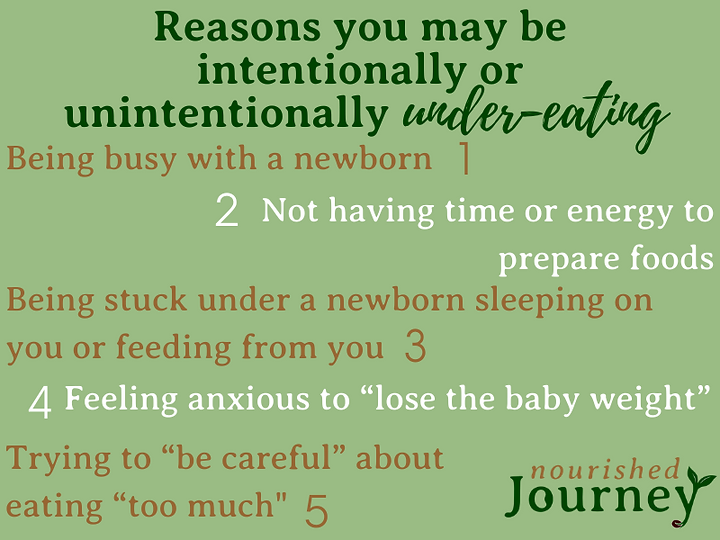
What happens when you under-eat?
Before I share tips about how best to approach nutrition for lactation, let’s first address the dangers of under-eating. Food restriction (whether intentional or unintentional) leads to lower milk supply and less of some nutrients that pass through the milk. There are no foods you need to avoid and no foods you “should” eat while lactating. Eat any foods you want, in any quantity that you want. In addition to impacting the quantity and quality of your milk supply, under-nourishing yourself will also hurt your birth recovery process, it will likely make you cranky and grumpy (on top of all the emotional swings that changing hormone levels and sleep-deprivation will already bring) and it will distract you from the most important part of postpartum- bonding with your little one and adjusting to life with baby in it. I’ve said it once and I’ll say it a thousand times: postpartum is NOT a time to diet. Read more about postpartum recovery priorities in this blog post.
How should you approach food/nutrition/eating?
So now that we’ve covered what NOT to do (restrict, diet, limit portions, under-eat), let’s talk about what TO do. First of all, you don’t have to eat perfectly, you just have to eat. Eat frequently and eat enough. You will likely feel very hungry; listen to your body. You may be surprised at how much you want to eat and can eat even though you don’t feel like you are being very “active”. I can’t tell you how many times I woke up at night to feed my baby and then went straight to the kitchen to feed myself. You thought pregnancy cravings were intense and you were hungry all the time? Just wait until you experience chest/breastfeeding hunger and cravings. Remember that producing milk is an energy expenditure, just like exercise is. So having increased hunger and caloric needs makes complete sense. Eating often throughout the day should help you keep your energy levels up and prevent you from getting hangry or developing brain fog. You may already be experiencing some mental deficits due to sleep deprivation and stress, so at least make sure that a lack of adequate calories isn’t contributing to making them any worse!
If you’re interested in more of the nitty gritty of nutrition, the next section has some detailed info. Not interested? Skip ahead. Just know that if you are eating enough and continuing to take your prenatal vitamin, you are doing a great job.
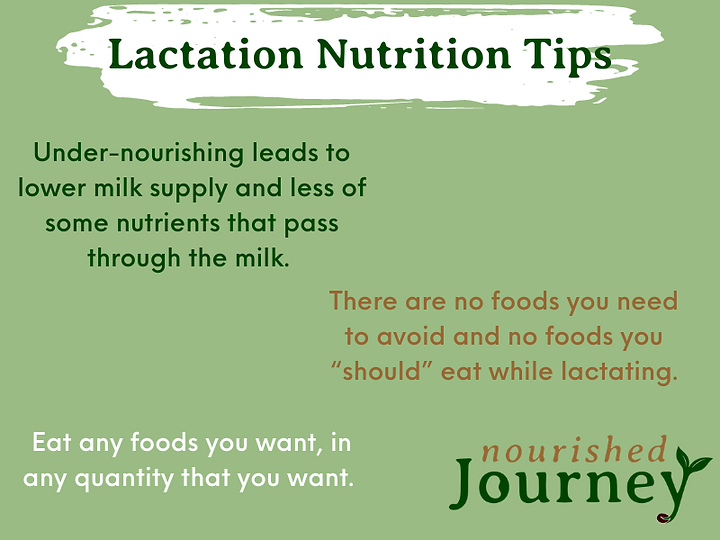
Specific nutrients:
B Vitamins in your diet impact the B Vitamins in human milk. Fortunately, if you eat a variety of foods and are eating to satisfy your voracious hunger, you need not worry about a deficiency. However, if you do not eat meat or animal products, it is important to make sure you are getting enough Vitamin B12 through a supplement.
Choline needs are very high- 550mg a day! Unless you are regularly eating organ meats or four eggs per day, you want to make sure you are getting some in a supplement. Check your multivitamin to see if it is included, as it’s not found in all brands.
Fats- The quality and quantity of fat in human milk is related to the eating patterns of the person lactating. Since fat is a satiating (filling, satisfying) nutrient, there may be a link between higher fat milk and a baby’s ability to be more content and feel full longer since it takes longer to digest. DHA (Docosahexaenoic acid) is the “brain and vision boosting” omega-3 fatty acid you probably focused on during pregnancy and your consumption of it will contribute to the concentration in your milk. DHA greatly benefits the baby’s development. Good food sources include fatty fish such as salmon, herring, tuna, mackerel, sardines and anchovies, and you can find lesser amounts of DHA in grass-fed animals, omega-3 enriched eggs or from free range chickens. You can also get some through a high quality supplement.
Good sources of Vitamin A include: butter, ghee, animal fats, fish, dairy products and fortified cereals. Your body can also make Vitamin A from micronutrients called provitamin A carotenoids which are commonly found in leafy green vegetables, orange and yellow vegetables, tomato products and many fruits. If you eat a decently varied diet, chances are you’re getting lots of Vitamin A and other vitamins and micronutrients.
Vitamin D- Human milk has been considered vitamin D-deficient and it is recommended that exclusively breast/chestfed infants receive 400 IU’s in a supplement to reach their needs. However, new research found that supplementing the lactating individual with 6,400IUs per day gave the lactating person enough Vitamin D to reach their own needs plus pass the needed 400IUs along to their baby. Your vitamin D status and plan for making sure baby gets enough is something you can discuss with your prenatal provider and/or baby’s pediatrician.
Iodine in milk is impacted by the lactating person’s food intake.The easiest way to ensure adequate iodine is to cook with iodized salt. You can also get it through seafood and seaweed products.
Vitamins and supplements
While you figure out your postpartum vitamin/supplement plan, continue your prenatal vitamins and talk to your provider or a dietitian about other supplements to consider. Most of your nutrients tend to come from food, but given the increased nutrient demands for early postpartum and lactating individuals plus emerging research on baby’s development and postpartum mood and anxiety disorders, having supplements on board can really give you some peace of mind and keep you feeling your best. Even if you wean or stop lactating, don’t immediately quit taking your vitamins/supplements and don’t jump into a restrictive diet plan. It’s still a good idea to listen to your hunger cues, eat to satisfy your hunger, and continue your prenatal vitamin for at least six months to replenish your nutrient stores.
Do I need to cut out gluten/sugar/dairy/cruciferous veggies/eggs?
Something I hear from parents often: “My baby is gassy/colicy/not sleeping well, etc.” There is no conclusive evidence on certain foods or food groups causing gassiness or colic, though you may notice certain foods affect your unique baby. Human milk is made from what passes into the lactating person’s blood, not what is in their stomach or digestive tract. So even if it makes you gassy it doesn’t mean that it’s making baby gassy. The only food that has evidence linked to gassiness and fussiness is cow’s milk protein, and this is for babies with this specific allergy/sensitivity. In general, food sensitivities are much less common than people have been led to believe.
Before you cut anything out, think about the big picture. Remember that fussiness and gas are normal, common characteristics of babies. They tend to outgrow them. If your baby is sensitive to something you ate, there will probably be other symptoms too. Look for excessive spitting up, vomiting, colic, rash, redness around the anus, changes in poop, or persistent congestion. Also zoom out and look at the environment the baby is in: is it calm or stressful? What are feedings like: are they stressed, rushed? Are they drinking milk from a bottle and ingesting more air? How is your milk supply? An oversupply of foremilk imbalance can lead to many of the same symptoms as a food sensitivity. How are you doing with making sure baby gets enough sleep and is sleeping according to their needs? Are you possibly mistaking fussiness as them being overtired? There are so many reasons why a baby might be fussy or gassy and eliminating foods may cause you unnecessary stress, can trigger disordered eating or an eating disorder, put you at risk of a nutrient deficiency, or lower your milk supply if it makes you reduce your overall intake.
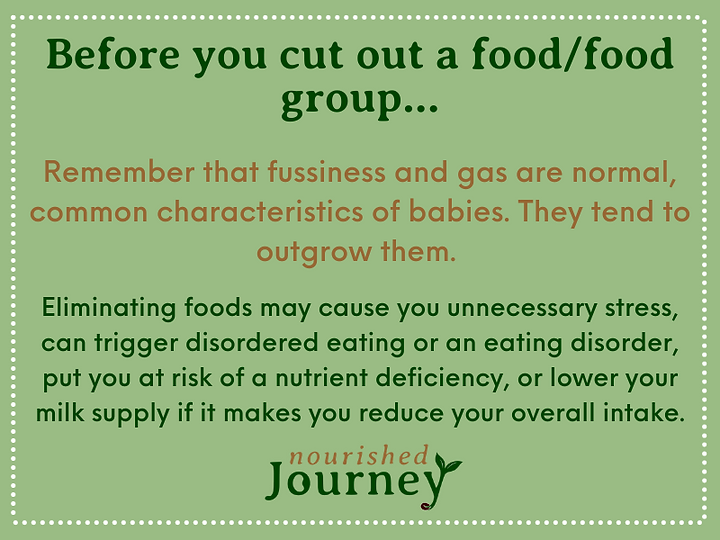
What about strong flavors?
Some strong flavors such as spicy foods and garlic may impact the flavor of your milk but there is no evidence that this causes fussy babies. In fact, some studies indicate babies may nurse better with flavored milk. Many people believe this is a nice way to start introducing different flavors to baby. There is no need to alter what you eat; if anything, maybe it’s a good time to try new foods and flavors!
Some tips to promote adequate intake:
You’ll remember at the beginning of this post I listed multiple reasons that a lactating person may have trouble getting enough to eat. Here are some ideas and suggestions for how to be proactive about getting sufficient nourishment:
- Have people bring you food. Whether this is your partner bringing you a plate from the kitchen or a friend bringing over some food to stock your fridge. I like recommending party platters with multiple sections which gives you variety and choices based on what sounds good.
- Have a list of snacks and simple meals you like to eat on the fridge. Then, if anyone is at your home helping you (family, friends, partner, etc) they can check that list for ideas of what to make which helps take the mental load of decision-making off of you.
- Set up the expectation for visitors to bring you food and water. We live in a society where asking for help has historically been deemed a sign of weakness. We’re told to pull ourselves up by our bootstraps and just “get er done,” so I understand if asking for or demanding help feels completely out of character for you. But now is the time to put it into practice. You may be the only lactating person that the baby has access to, but responsibility for taking care of you and that baby can and should be shared between all the capable adults (and even your other kids, if you have them). Be kind, of course, but ask specifically and boldly for what you need and accept help graciously. In most cases, people that love and care for you will be glad you’ve given them some direction on how they can best help you. When a friend comes over to meet baby and visit with you, ask them to fill up your water cup, grab you a snack, pick up some take-out or bring a freezer meal.
- Have snacks by your bed, in your diaper bag, in the living room, in your car glove compartment and wherever you usually sit to feed baby. Have a stash of shelf-stable things that are easy to eat with one hand. Ideas include: trail mix, nuts, dark chocolate, snack bars, chia seed or fruit puree pouches, dried fruit, beef jerky, nut butter pouches, crackers, or pretzels. Even a bag of apples, clementines or another fruit that’s safe at room temperature is something you can keep on-hand anywhere in your home. The last thing you want is for baby to fall asleep in your arms or you to sit down to breast/chestfeed and realize you’re starving, but have no snacks within reach. Put snacks everywhere and decrease the likelihood of this happening!
Don’t forget about hydration!
Water and liquids are equally important to nutritional intake from food. I can’t put it more plainly: drink lots of water. Put full water bottles everywhere- by the couch, bed, in the kitchen, in your car, on your way out the door, etc. You can also buy a gigantic 64- or 128-ounce water bottle and fill it up once in the morning, then work your way through it for an entire day. Some people prefer this option as you only have to fill it up once and it’s easy to track and see how much you’ve consumed. If you’re tired and bored of water or just find it difficult to drink enough, play around with what kind of bottle/straw you like best. Some people love straws while others can easily drink more from an open cup. I personally love an insulated water bottle with a straw to keep water cold and sippable all day. Lastly, consider an electrolyte supplement or include coconut water in your rotation. Electrolytes are lost in breastmilk and they need replacing. You can also season your food with salt according to your taste preferences; salt is essential and needs replenishing!
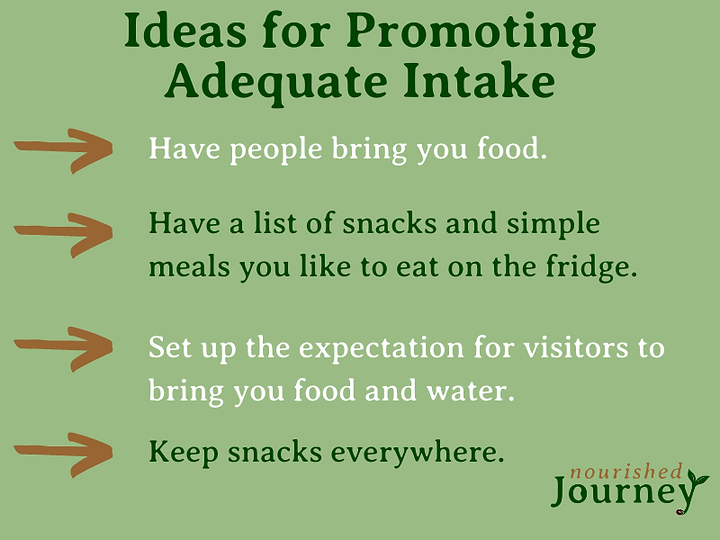
Resources for help with breast/chestfeeding
I know that breast/chestfeeding can come with many challenges, and nutrition may actually be the last thing on your mind if you’re struggling with other aspects of lactation and feeding. Here are a few of my favorite resources to seek help from:
- IBCLCs (International Board Certified Lactation Consultants) are a great resource. You can find one near you using this search tool or ask your prenatal provider or pediatrician if they have a recommendation.
- La Leche League– read about them here. Or find a local chapter near you here.
- KellyMom.com is a great resource with tons of articles, blog posts and answers to FAQs.
If you’re a lactating individual and would like to work one on one with a dietitian to ensure good nutrition for you and baby or to work towards ditching the diet mindset and making peace with your body, schedule a discovery call with me here. I’d love to chat with you about my approach to nutrition, body image, postpartum recovery and pursuing general health and wellness.
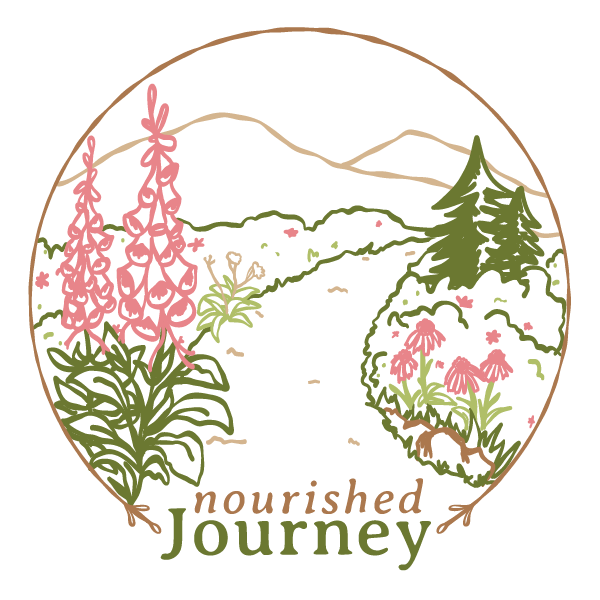
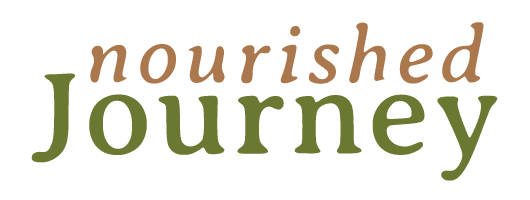


 Hi! I’m Emily.
Hi! I’m Emily.

0 Comments